
What's the best financial investment for the next five years?—Dave
Finding a safe harbor for your money in the short- to mid-term creates a challenging check list.
You want your money to take on more risk and earn you more than if it were just hanging out in your savings account, earning hardly anything. But you also want it to be relatively accessible on a five-year timeline.
The good news is you can cross a few things off your list right away. Like real estate.
"When you're looking for liquidity and safety on a horizon of only five years, you don't want to be invested in a piece of real estate that you have to work desperately to get out of in a down market," says Derek Green, a broker and investment adviser with Titus Wealth Management in Folsom, California.
Also: Put down the cryptocurrencies.
Sure, there's potential for growth by investing in cryptocurrencies like bitcoin and ethereum, but the up and down swings in those markets make them too risky for a five-year span, according to Green.
"Cryptocurrencies are extremely volatile," says Green "If it has had a period of downside volatility and you have to sell after five years, it isn't going to be a desirable situation."
So what will keep your money growing with manageable risk in the next half decade?
Catch the economic tailwinds
Given the economic climate, the stock market remains among the best havens for your money. But some stocks may be safer than others, says Green.
"The small- and mid-caps will likely have more of a tailwind given rising rates, a changing tax situation and trade tensions," says Green. "Rather than the larger, internationally-oriented companies in the S&P 500."
A small-cap, or a stock with a small "capitalization" as determined by the total market value of its shares, is stock of companies that generally have a market capitalization between $300 million to $2 billion. Mid-cap stocks are those between $2 billion and $10 billion. (Large cap stocks are those over $10 billion).
For those looking for something a little safer, Green recommends shorter maturity bonds or a short-term bond exchange traded fund. A shorter duration means less credit risk and less interest rate risk. And those are both good things in a rising interest rate market.
Look for a higher yield
Looking beyond investments, Green advises finding somewhere other than your savings account for the money.
"You're probably going to lag behind the rate of inflation in a savings account," he says.
Of course, there are high yield savings accounts available. While they tend to be among the safest options with the lowest risk, they offer the lowest returns. Use these only if security and accessibility to the funds is paramount.
Better than savings accounts are CDs, or certificates of deposit, which are insured, timed deposits offered by banks and credit unions that have very low risk, but offer slightly better returns than savings accounts.
"CDs are getting more attractive as short-term interest rates increase."
For example, a CD with a five-year term, might carry an annual percentage yield of 2.65%.
Don't set and forget
Given the relatively short time horizon and the dynamic economic picture, Green advises that you keep your eyes on that money and be a little more proactive with your investments than usual.
The reality is, he says, there are just too many things in play to leave your money alone for very long.
"We may go from rising interest rates to falling interest rates during that five year cycle," says Green. "I would recommend semi-annual to annual rebalancing of the portfolio."
Have a money question for Money Moves? Ask us here to be included in a future column.
